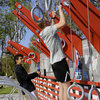Having created ‘a library without walls’ during COVID, Carle is set to retire
— Photo from Heidemarie Carle
Rensselaerville Library Director Heidemarie Carle took the job just before COVID-19 shut down the library, and precluded many of the early goals she had established. She credits her lack of experience in managing a library with allowing her the freedom to improvise during what would become a long period of rebirth.
RENSSELAERVILLE — When Heidemarie Carle came to this little Hilltown from California in 2019, it was in part to seek an escape from the wildfires that were raging in the state, which had left her and her partner helping their friends “sift through the ashes of their home” the year prior, she told The Enterprise at the time.
Little did she know then that, as the new director of the Rensselaerville Library, she’d soon once again be recovering a storied building from the ashes of a different kind of calamity.
As she prepares to retire next month, Carle highlighted her relative naïveté as contributing to the library’s success during its pandemic-induced shutdown.
Thrust into the position of keeping the library afloat and useful to the community without any real experience leading a library left her “without the institutional memory of ‘how things used to be done’ getting in the way,” she told The Enterprise. “It made me, and by extension, the library more flexible when implementing pandemic policies and procedures. You could say I didn't know any better. The new normal was my normal normal.”
Carle called the pandemic “a bushelful of lemons” that, along with the staff, she’s proud to have turned into “batches of lemonade.”
“We upgraded the library newsletter to provide weekly dispatches about library and community services available during the closure,” she said. “The newsletter is now published twice a month and serves as an information hub for the entire library community including notices from the town of Rensselaerville and Rensselaerville non-profit organizations.
“I’m also proud of the way the library looks and feels — spacious, light, and more comfortable,” she said. “The closure gave us the time and impetus to clear the decks and clean out the closets. Volunteers did a deep clean of the library and cleared surfaces and closets of clutter. Most importantly, we were able to finish a long-planned reorganization and weeding of the collection, freeing up shelf space and making books easier to access.”
Carle and her staff also increased the comfort level within the library, obtaining thousands of dollars in grant money for climate-control systems, along with more lighting and a laptop counter. And, “I’m looking forward to spending retirement time in the wingback chairs staring out over Ten Mile Creek,” Carle added.
As meaningful as the achievements have been to Carle, they were of course very different from those she had been hoping for pre-pandemic. Before taking the job, she had worked in administration for nonprofits and government agencies around the country, mostly “organizing big events.” Naturally, her goals when she arrived “included promoting library usage and expanding community outreach.”
But, as she quoted her mother and the poet Goethe as saying in her annual director’s report last month, “Man proposes, and God disposes.”
From March 13, 2020 on, “all energy was focused on returning to normal while keeping our library community safe,” Carle said, which itself was a constantly evolving task as COVID-19 itself evolved its way “through the Greek alphabet” and “thwarted us every step of the way.”
“There are many analogies that I’ve used to describe navigating our unique little library through the Covid pandemic,” she said. “Lemons/lemonade is a standard and I’ve used rollercoaster in my ‘A Page From Our Book’ column in the newsletter. But none come as close as picturing the library full of books and services as the trainload in Watty Piper’s ‘The Little Engine That Could,’ and the pandemic as mountain tracks, steep and curvy with dark tunnels and landslides and the occasional cow on the track.
“We needed an engine to get the trainload over the mountain to the people on the other side,” she continued. “Our library community — trustees, staff, volunteers, and patrons — were the little engine repeating to itself, ‘I think I can. I think I can. I think I can.’”
Still, the immense effort of it all — “the battle toward normalcy,” as Carle put it — “has been exhausting,” she said, explaining that her retirement is meant to enable someone “with fresh energy to move the library forward in the next phase of re-opening. I’ve spent three years putting systems in place to make a transition easier and feel comfortable that the next director will be able to hit the ground running, implementing the board’s plans for expanding programs.”
That groundwork includes a proposed position-management plan in the 2023 budget that includes hiring a part-time program and community-outreach coordinator who would not only coordinate the programs, but also find the funding to pay for them.
The library’s board of trustees, Carle said, is working with the town and Albany County Sheriff's Office to lease space in the public safety building in Medusa for use as a program venue, and eventually, an annex providing library services.
The new location will provide program space, which is accessible to people with handicaps and also has parking, Carle said, and can provide additional access to public computers and free Wi-Fi.
“Achieving this goal, which is outlined in the Library's 2021-2024 Strategic Plan, will be a major priority of the incoming library director,” she said.
When Carle leaves on Nov. 3, library staff member Patrick Wynne will step up as interim director while the board seeks a new director, which Carle said should be accomplished by early January.
Until then, she and Wynne “are attempting to achieve a Vulcan mind-meld, transferring my institutional knowledge before I leave. There is a multiple-page list of subjects to cover, everything from status of current contracts to the location of the specialized screwdriver that unlocks the windows in the Reading Room.”
And, although Carle is not originally from Rensselaerville, she’ll be sticking around, and focusing on slowing her life down to a comfortable pace, and enjoying moments outside of work as she maintains her health and home, she said.
Her parting advice: “The next time you visit your library, thank your library director. This is the most difficult position I’ve ever held. I don’t know that we would have had a successful emergence from the pandemic closure without the tireless support of the library directors of the Upper Hudson Library System. We teleconferenced weekly from home offices, basement laundry rooms, and kitchen tables working to squeeze every lemon COVID threw our way.
“I’m proud to have worked alongside these passion-fueled professionals as we faced our new reality, creating a library without walls. And I’m proud to have been able to share this passion with the Rensselaerville Library community and hope to continue to do so into the future as a Rensselaerville Library volunteer. After all, it is my library.”


